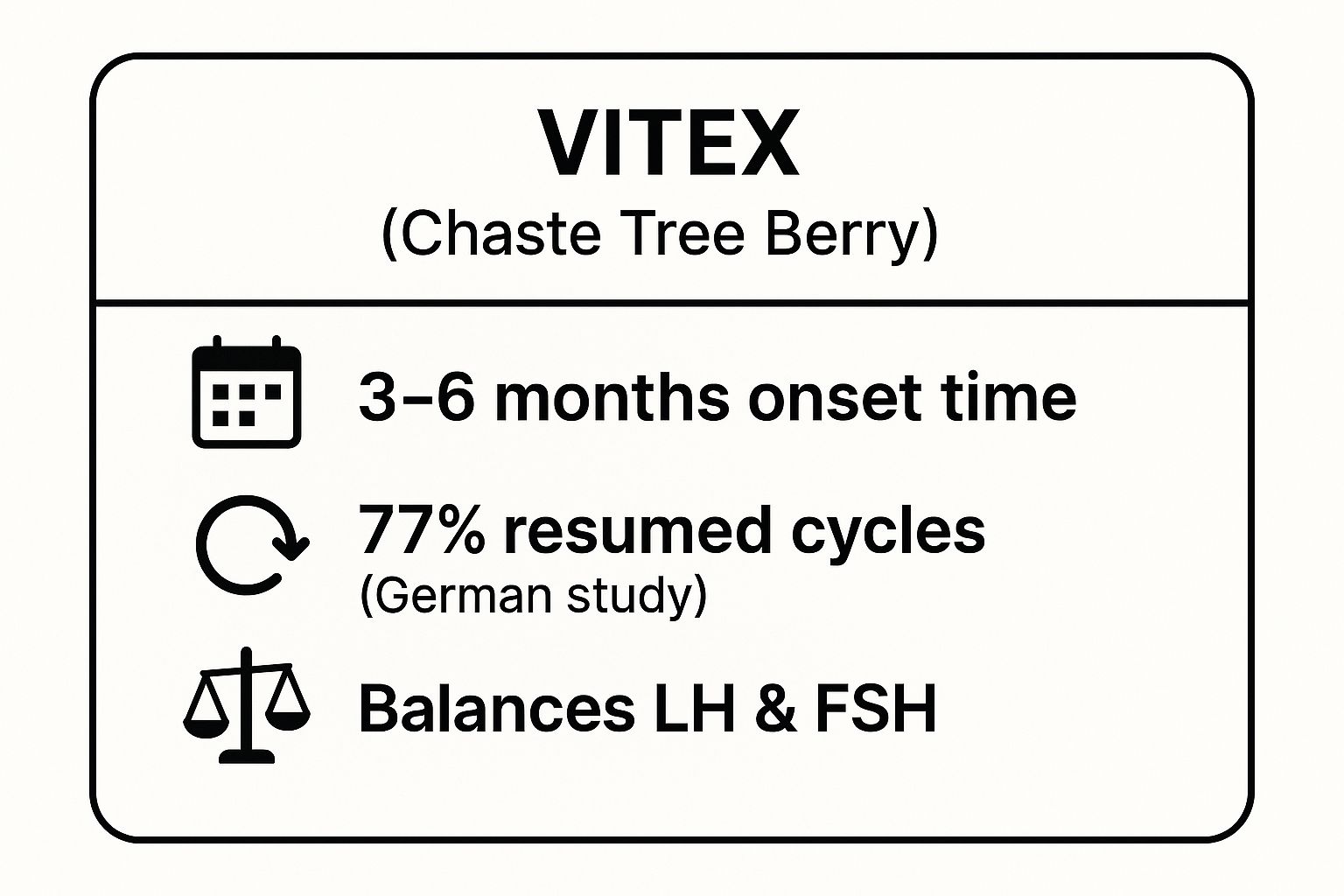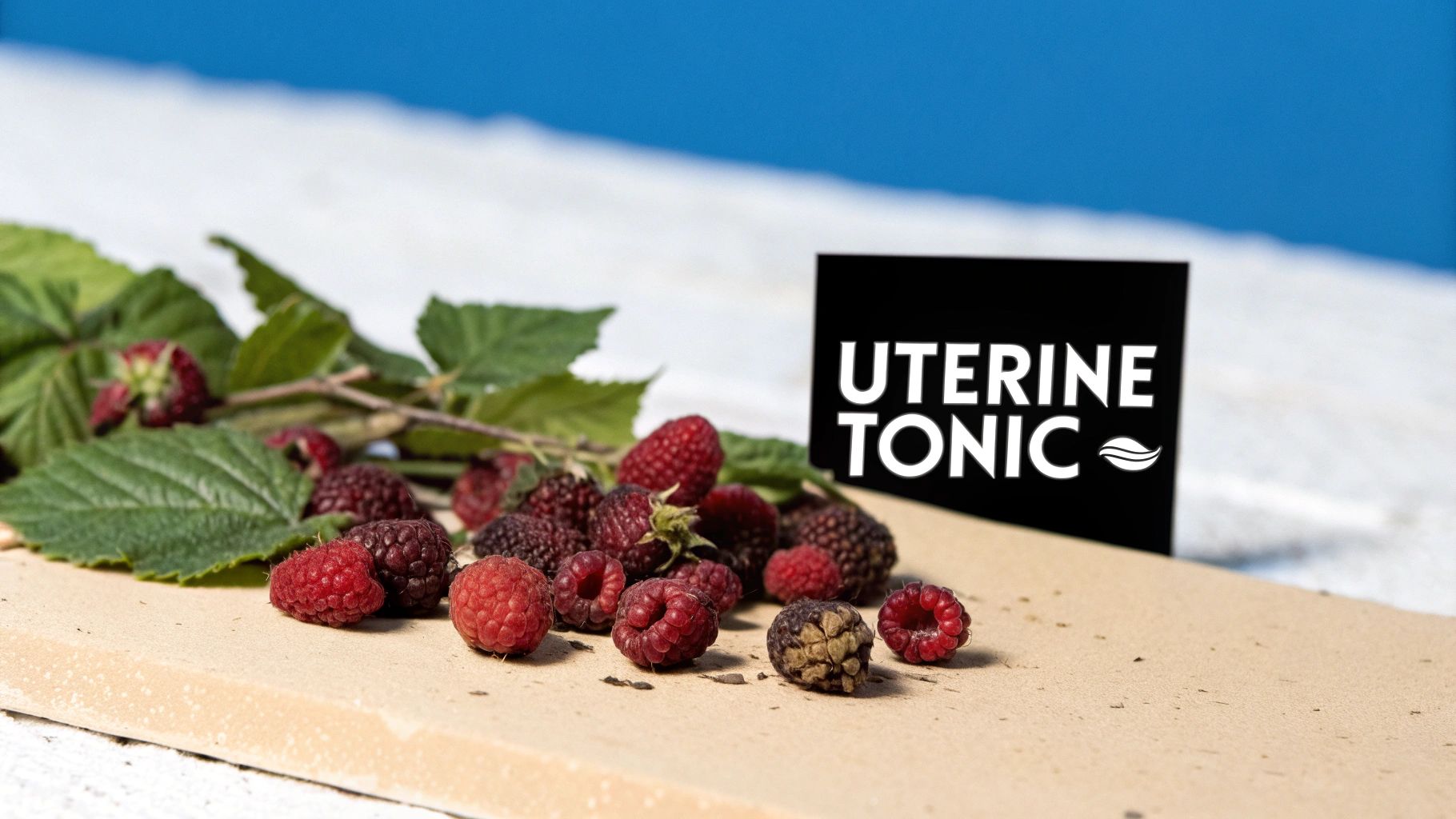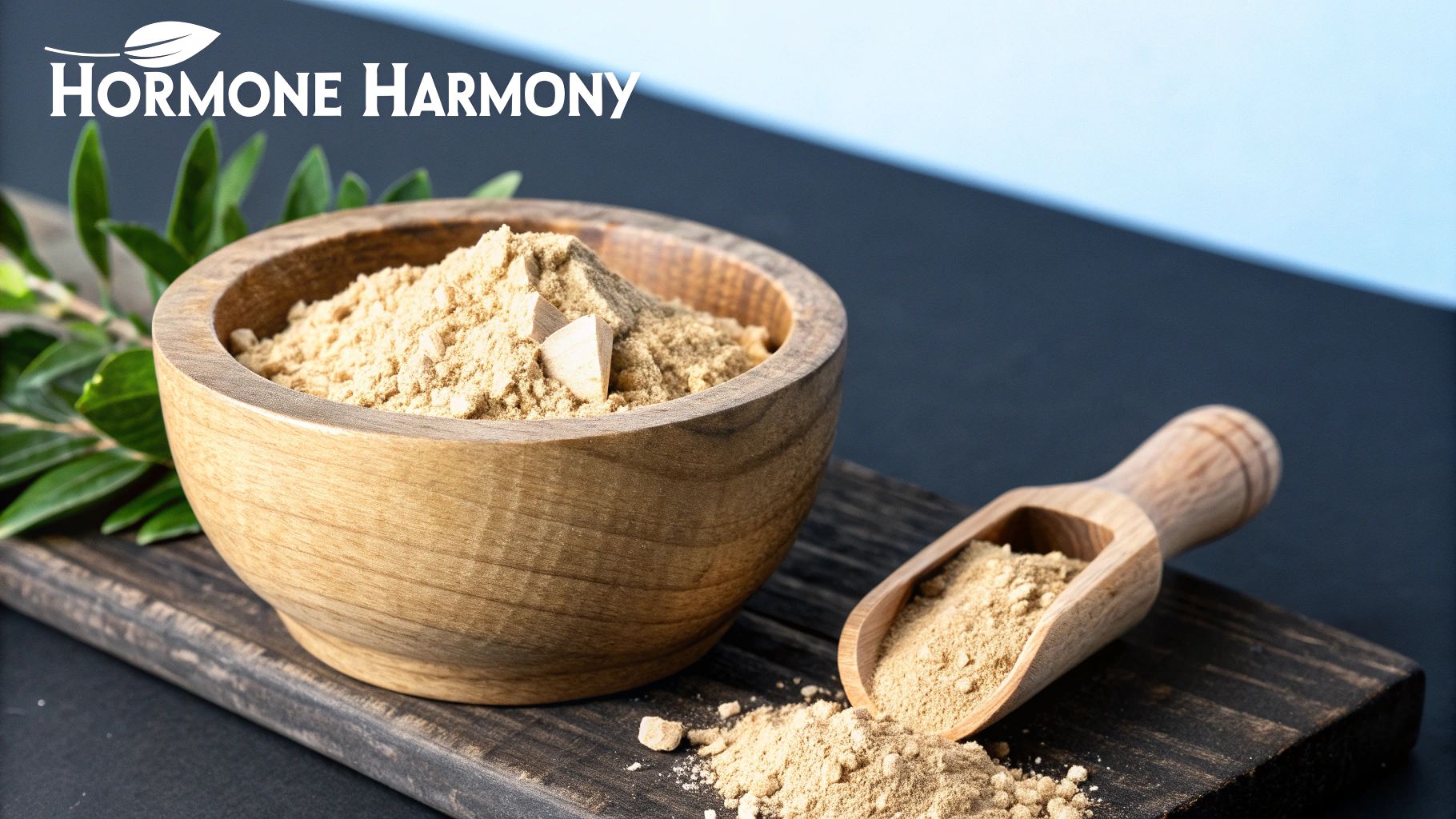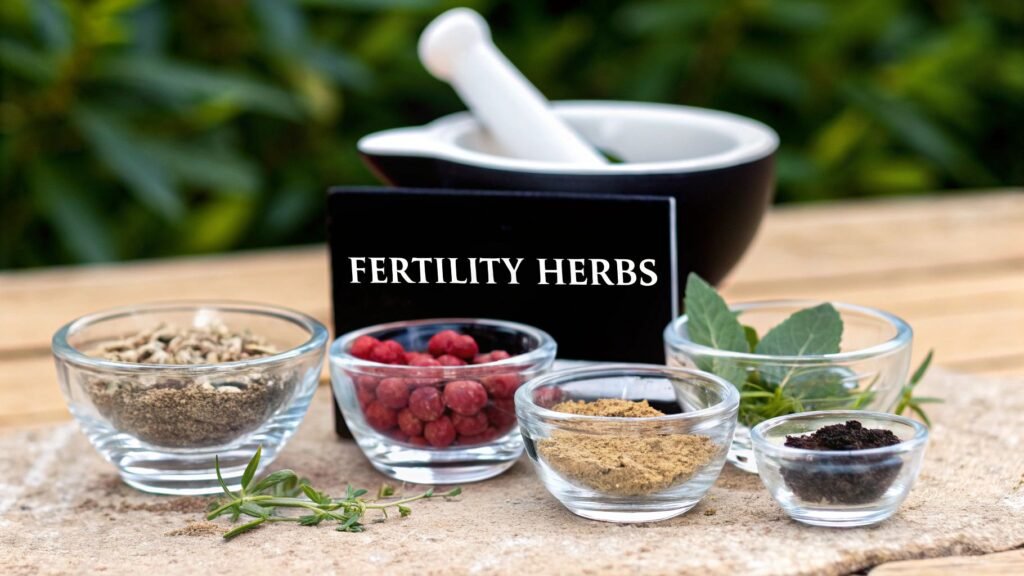Embarking on the path to parenthood is a profound journey, and for many, exploring natural support is a vital step. While modern medicine offers remarkable solutions, the ancient wisdom of herbalism provides a complementary approach to enhance reproductive health and balance the body. The search for the best herbs for fertility can be overwhelming, filled with conflicting information and anecdotal claims that are difficult to verify.
This guide cuts through the noise. We will provide a detailed, evidence-based roundup of six powerful herbs that have stood the test of both time and scientific scrutiny. You will learn precisely how these botanicals work, from regulating critical hormones and improving uterine health to reducing the physiological impact of stress on the reproductive system. Each entry will offer actionable insights into benefits, recommended usage, and essential safety considerations.
This comprehensive list is designed to empower you with clear, practical knowledge to make informed decisions about your wellness. However, it is crucial to remember that herbal medicine is potent and requires professional guidance. This information is not a substitute for a personalized medical consultation. For a strategy tailored to your unique health profile, consulting with a specialist who integrates Traditional Chinese Medicine with a background in Western health sciences ensures a safe and effective approach. Let’s delve into the botanicals that can support your fertility journey.
1. Vitex (Chaste Tree Berry): The Master Hormone Regulator
Vitex agnus-castus, more commonly known as Chaste Tree Berry, stands as one of the most powerful and well-researched herbs for female fertility. Its reputation as a master hormone regulator is earned not because it contains hormones, but because of its sophisticated action on the body's primary hormonal control center: the hypothalamic-pituitary-ovarian (HPO) axis.
This herb works by modulating pituitary gland function, which in turn helps balance the key hormones governing the menstrual cycle. Specifically, Vitex promotes the production of luteinizing hormone (LH) while gently inhibiting follicle-stimulating hormone (FSH). This subtle yet profound shift is critical for encouraging consistent ovulation and correcting hormonal imbalances that hinder conception.
How Vitex Enhances Fertility
The primary benefit of Vitex lies in its ability to address common underlying causes of infertility, particularly those related to hormonal irregularities. It is one of the best herbs for fertility precisely because it targets the root of the problem rather than just the symptoms.
Key fertility-enhancing actions include:
- Lengthening Short Luteal Phases: A short luteal phase (the time between ovulation and menstruation) can prevent a fertilized egg from implanting. Vitex helps raise progesterone levels naturally, extending this crucial phase and creating a more stable uterine environment.
- Promoting Regular Ovulation: By balancing LH and FSH, Vitex encourages the body to ovulate regularly. This is invaluable for women with irregular cycles, including conditions like amenorrhea (absence of menstruation).
- Normalizing Progesterone Levels: Adequate progesterone is non-negotiable for maintaining a healthy pregnancy. Vitex's indirect action on the pituitary gland supports the body's own progesterone production, addressing a common issue known as luteal phase defect.
The following infographic highlights the key data points associated with Vitex's efficacy, showing how it supports hormonal balance over time.

These metrics underscore Vitex's role as a long-term hormonal balancer, with clinical evidence demonstrating its ability to restore normal cycles in a significant percentage of users. The balance of LH and FSH is the core mechanism behind these successful outcomes.
Practical Implementation and Dosage
To effectively incorporate Vitex into your fertility journey, consistency and proper timing are essential. This herb requires patience, as its effects are cumulative and build gradually over several cycles.
Actionable Guidelines:
- Dosage: A typical dose is 400-500 mg of a standardized extract (containing 0.5% agnuside or 0.6% aucubin) taken once daily.
- Timing: Take Vitex first thing in the morning on an empty stomach. This timing is believed to optimize its influence on the pituitary gland.
- Duration: Commit to using it consistently for at least three to six months before assessing its full impact on your cycle.
- Monitoring: Track your basal body temperature (BBT) and cervical mucus to observe changes, particularly the lengthening of your luteal phase.
- Discontinuation: Once you confirm pregnancy, it is recommended to discontinue use and consult your healthcare provider.
2. Red Raspberry Leaf: The Ultimate Uterine Tonic
Red Raspberry Leaf (Rubus idaeus) is celebrated in herbal medicine as a supreme uterine tonic, with a history spanning centuries. Unlike herbs that directly influence hormones, Red Raspberry Leaf’s primary role is to nourish, tone, and strengthen the uterine muscle itself. This prepares the uterus for conception and a healthy pregnancy, making it one of the best herbs for fertility.
Rich in fragarine, an alkaloid that helps tone the muscles of the pelvic region, including the uterus, this herb helps improve uterine blood flow and overall function. Its impressive nutritional profile, packed with calcium, iron, potassium, and B vitamins, provides essential building blocks for reproductive wellness and helps create an ideal environment for implantation.

How Red Raspberry Leaf Enhances Fertility
The main advantage of Red Raspberry Leaf is its ability to create a strong, healthy, and receptive uterine environment. By toning the uterine walls, it not only prepares the body for conception but is also traditionally used to support an easier labor and postpartum recovery.
Key fertility-enhancing actions include:
- Strengthening the Uterine Lining: A well-toned uterus with a healthy, well-nourished lining is crucial for the successful implantation of a fertilized egg. The nutrients in Red Raspberry Leaf directly support the development of this vital tissue.
- Improving Uterine Blood Flow: The herb helps increase circulation to the uterus, ensuring it receives an adequate supply of oxygen and nutrients. This improved blood flow is fundamental for both conception and maintaining a viable pregnancy.
- Balancing Pelvic Muscle Function: The fragarine alkaloid helps regulate uterine muscle contractions. This toning action is believed to help prevent miscarriage due to an atonic or spastic uterus, creating a more stable environment for a developing embryo.
The long-standing use of this herb by midwives and herbalists, like the renowned Susun Weed, underscores its value. Fertility clinics and nutritionists often recommend it in tea blends as a foundational element of a preconception care plan, highlighting its gentle yet powerful supportive role.
Practical Implementation and Dosage
To gain the most benefit from Red Raspberry Leaf, it should be consumed regularly over several months leading up to conception. Its effects are nutritive and build over time, much like a healthy diet.
Actionable Guidelines:
- Dosage: As a tea, drink 2-3 cups daily. Use 1 tablespoon of dried, organic leaves per cup of hot water and steep for 10-15 minutes, covered. In capsule form, a typical dose is 400-800 mg taken daily.
- Timing: The tea can be enjoyed at any time of day and is often used as a replacement for caffeinated beverages.
- Duration: Begin taking Red Raspberry Leaf at least three months before you plan to start trying to conceive to allow adequate time for its toning effects to build.
- Combinations: For enhanced nutritional support, it combines well with other nutritive herbs like Nettle Leaf and Oat Straw.
- Safety: While generally considered safe throughout the menstrual cycle and even into pregnancy, it is always best to consult with a healthcare provider or herbalist, especially once you become pregnant.
3. Tribulus (Tribulus terrestris): The Dual-Action Fertility Enhancer
Tribulus terrestris is a potent adaptogenic herb renowned for its powerful effects on both male and female reproductive health. Unlike herbs that target a single aspect of fertility, Tribulus offers a dual-action approach, making it one of the best herbs for fertility for couples. Its benefits are primarily attributed to active compounds called steroidal saponins, particularly protodioscin, which are believed to support healthy hormone production and function.
For men, Tribulus is widely celebrated for its ability to naturally support testosterone levels, which is crucial for libido and sperm production. For women, it helps normalize ovulation, especially in cases of anovulatory infertility, and supports the overall health of the reproductive system. This makes it a uniquely versatile tool in a natural fertility protocol.
How Tribulus Enhances Fertility
Tribulus works by stimulating the body's natural hormone pathways without introducing external hormones. It is thought to act on the pituitary gland to increase luteinizing hormone (LH) in both men and women. In men, LH signals the testes to produce more testosterone. In women, LH is the hormone that triggers ovulation, making it invaluable for cycle regulation.
Key fertility-enhancing actions include:
- Improving Sperm Parameters: Extensive research, much of it originating from Bulgaria, has demonstrated Tribulus's ability to significantly improve sperm count, motility (movement), and morphology (shape). This directly enhances male factor fertility.
- Promoting Regular Ovulation: For women with irregular cycles or conditions like Polycystic Ovary Syndrome (PCOS), Tribulus can help restore a predictable ovulatory pattern by supporting the LH surge necessary for an egg to be released.
- Enhancing Libido and Sexual Function: By supporting healthy testosterone levels in both sexes (testosterone is also vital for female libido), Tribulus can improve sexual desire and function, increasing the chances of conception through more frequent intercourse.
- Supporting Follicular Development: Some evidence suggests Tribulus may improve the environment for developing eggs (follicles), potentially leading to better egg quality and a healthier reproductive cycle overall.
The following infographic illustrates the key benefits of Tribulus for both male and female fertility, highlighting its impact on critical reproductive markers.
These metrics showcase why Tribulus is considered a cornerstone herb for addressing infertility from multiple angles, particularly when both male and female factors may be contributing.
Practical Implementation and Dosage
To achieve the best results with Tribulus, it's important to use a high-quality, standardized extract and follow a consistent dosing schedule. The effects are cumulative, especially for improving sperm parameters, which requires several months.
Actionable Guidelines:
- Dosage: A standard dose ranges from 750-1500 mg per day, taken in divided doses. Look for a product standardized to contain a minimum of 40% steroidal saponins.
- Timing: Take Tribulus with meals to enhance absorption and minimize the potential for digestive upset.
- Cycling: To maintain its effectiveness and prevent the body from building a tolerance, consider a cycling strategy, such as taking it for five days on and two days off.
- Duration for Men: For improving sperm health, consistent use for a minimum of three months is recommended, as this aligns with the full cycle of sperm development (spermatogenesis).
- Considerations for Women: Women, especially those with PCOS, should start at a lower dose and monitor their cycle for changes. It is typically used from the beginning of the menstrual cycle until ovulation is confirmed.
- Discontinuation: Stop taking Tribulus once pregnancy is confirmed. Always consult with a healthcare professional before starting any new supplement regimen.
4. Maca Root: The Adaptogenic Fertility Superfood
Lepidium meyenii, commonly known as Maca Root, is a potent Peruvian cruciferous vegetable hailed for centuries as a natural booster for vitality and reproductive health. Unlike herbs that contain phytohormones, Maca works as an adaptogen. It nourishes the endocrine system, specifically supporting the hypothalamic-pituitary-adrenal (HPA) axis, to help the body balance its own hormone production naturally and adapt to stressors.
This powerful root is nutrient-dense, packed with essential amino acids, fatty acids, vitamins, and minerals that create an optimal environment for fertility. Its ability to support hormonal equilibrium without introducing external hormones makes it a uniquely safe and effective choice for both men and women, solidifying its place as one of the best herbs for fertility.

How Maca Enhances Fertility
Maca’s primary strength lies in its ability to enhance endocrine function and provide foundational nutritional support for reproductive wellness. It addresses fertility from a holistic perspective, improving overall energy, libido, and hormonal function, which are all crucial for conception.
Key fertility-enhancing actions include:
- Improving Sperm Health: Maca is particularly beneficial for male fertility. Landmark Peruvian studies, including those led by renowned researcher Dr. Gustavo Gonzales, have demonstrated significant improvements in sperm volume, count, and motility after just four months of consistent use.
- Balancing Female Hormones: For women, Maca helps regulate the estrogen-progesterone balance by supporting the pituitary gland. This can lead to more regular menstrual cycles, improved ovulation, and a healthier uterine lining.
- Boosting Libido and Sexual Function: Clinical trials have consistently shown that Maca increases sexual desire and performance in both men and women. A healthy libido is a key component of a successful conception journey.
Its role in enhancing vitality is also recognized in various healing systems. While not a traditional Chinese herb, its function of nourishing the body and strengthening energy aligns with core principles of Traditional Chinese Medicine (TCM). For those interested in this holistic approach, you can learn more about how Traditional Chinese Medicine addresses health and wellness.
Practical Implementation and Dosage
To gain the most from Maca Root, it's important to choose the right type and use it consistently. Its effects are cumulative, so integrating it into your daily routine is key to seeing significant benefits for your reproductive health.
Actionable Guidelines:
- Dosage: Start with a lower dose of 1,500-3,000 mg (1.5-3 grams) per day. You can gradually increase this amount as your body adapts, but it is best to consult with a healthcare provider for personalized guidance.
- Form: Gelatinized Maca is recommended as it is pre-cooked to remove starches, making it easier to digest and absorb than raw Maca powder.
- Timing: Take Maca in the morning. Due to its energizing properties, taking it later in the day may interfere with sleep.
- Cycling: To maintain its effectiveness, consider cycling your intake. A common approach is taking it for five days and then taking a two-day break.
- Incorporation: The powder has a nutty, earthy flavor that mixes well into smoothies, oatmeal, yogurt, or even baked goods. This makes it easy to incorporate into your daily diet.
5. Ashwagandha: The Adaptogenic Stress Reducer
Withania somnifera, more commonly known as Ashwagandha, is a celebrated adaptogenic herb from Ayurvedic medicine. Its powerful effects on fertility stem from its ability to combat stress, a significant and often overlooked barrier to conception. Ashwagandha works by regulating the body's stress response system, primarily by modulating cortisol levels and supporting the hypothalamic-pituitary-adrenal (HPA) axis, which is intricately linked to reproductive function.
This herb's strength lies in its ability to enhance resilience to physical and emotional stressors, thereby creating a more favorable internal environment for conception. By lowering elevated cortisol, Ashwagandha helps prevent the hormonal cascade that can disrupt ovulation in women and negatively impact sperm production in men, making it one of the best herbs for fertility, especially in modern, high-stress lifestyles.
How Ashwagandha Enhances Fertility
Ashwagandha's primary contribution to reproductive health is its profound impact on stress reduction and its direct benefits for male reproductive parameters. It addresses the physiological consequences of chronic stress that can sabotage fertility efforts in both partners.
Key fertility-enhancing actions include:
- Improving Sperm Quality and Count: Ashwagandha has demonstrated remarkable efficacy in male fertility. An influential Indian study highlighted a 167% increase in sperm count, a 53% increase in semen volume, and a 57% rise in sperm motility in men treated with the herb.
- Boosting Testosterone Levels: Healthy testosterone is crucial for spermatogenesis. Research has shown that men taking Ashwagandha experienced an average 17% increase in testosterone levels, directly supporting male reproductive health.
- Balancing Cortisol Levels: For women, chronic stress and high cortisol can suppress gonadotropin-releasing hormone (GnRH), leading to irregular or absent ovulation. Clinical trials show Ashwagandha effectively reduces cortisol in stressed adults, helping to restore hormonal balance conducive to regular cycles.
- Supporting Thyroid Function: As an adaptogen, it may also help support thyroid function, which is critical for maintaining a healthy pregnancy and preventing miscarriages.
The herb's adaptogenic properties also help manage conditions like anxiety and fatigue, which can indirectly affect libido and the emotional capacity to pursue conception. Learn more about the multifaceted benefits of herbal medicine for mental and emotional well-being on drerictsai.com.
Practical Implementation and Dosage
To leverage Ashwagandha's benefits for fertility, consistency is paramount. Its effects are cumulative, with most studies observing significant results after several months of regular use.
Actionable Guidelines:
- Dosage: A standard dose is 300-600 mg of a high-quality, standardized root extract (containing at least 5% withanolides) taken daily, often split into two doses.
- Timing: Take with meals to enhance absorption and minimize potential stomach upset. If you find it causes drowsiness, taking it in the evening can also promote restful sleep.
- Duration: Commit to using Ashwagandha consistently for at least three months to properly assess its impact on stress levels and fertility markers.
- Quality: Choose reputable branded extracts like KSM-66 or Sensoril. These are backed by clinical research and guarantee potency and purity.
- Precautions: Avoid Ashwagandha during pregnancy. It is also not recommended for individuals with autoimmune conditions or hyperthyroidism without consulting a healthcare provider.
6. Dong Quai (Angelica sinensis): The Premier Blood Tonic
Angelica sinensis, revered as Dong Quai or 'female ginseng,' is a cornerstone of Traditional Chinese Medicine (TCM) for enhancing female reproductive health. Its power lies not in direct hormonal action, but in its profound ability to nourish and invigorate the blood, a concept central to fertility in TCM. Dong Quai promotes robust blood flow to the reproductive organs, ensuring the uterus and ovaries receive the vital nutrients needed to function optimally.
The herb contains unique compounds, such as ferulic acid and ligustilide, which help improve circulation to the pelvic region and support the body's natural estrogen balance. This dual action of nourishing blood and improving its movement makes Dong Quai one of the best herbs for fertility, particularly for women experiencing irregular cycles or a thin uterine lining.

How Dong Quai Enhances Fertility
Dong Quai’s primary contribution to fertility comes from its role as a superior blood tonic and circulatory aid. It addresses fundamental imbalances that can prevent conception and a healthy pregnancy, solidifying its place in fertility protocols for over a millennium. As a key herb in many TCM formulas, its efficacy is well-documented in both historical texts and modern clinical settings.
Key fertility-enhancing actions include:
- Improving Uterine Health: By increasing blood flow to the uterus, Dong Quai helps build a thick, nutrient-rich endometrial lining. This is crucial for successful embryo implantation and is why it is often recommended by integrative fertility specialists.
- Regulating Menstrual Cycles: Dong Quai helps to harmonize the cycle by addressing blood deficiency, a common cause of amenorrhea (absent periods), oligomenorrhea (scanty periods), and painful menstruation (dysmenorrhea).
- Balancing Estrogen Levels: The herb contains phytoestrogens, plant-based compounds that can help modulate estrogen activity in the body. This gentle balancing effect supports healthy follicular development without overpowering the body’s natural hormonal cascade.
The herb's long history is a testament to its value. It has been a primary component in Chinese fertility formulas for centuries, often combined with other herbs to create a synergistic effect. For those interested in a deeper understanding, you can learn more about Traditional Chinese Medicine for fertility and its holistic approach.
Practical Implementation and Dosage
To leverage the benefits of Dong Quai, proper timing within the menstrual cycle is critical. Its blood-moving properties mean it should be used strategically to support follicular growth and uterine preparation while being avoided during menstruation itself.
Actionable Guidelines:
- Dosage: A common dose is 500-1,000 mg of a standardized extract or dried root powder, taken two to three times daily.
- Timing: Take Dong Quai only during the follicular phase (from the end of menstruation up to ovulation). Discontinue use once menstruation begins to prevent potentially heavier bleeding.
- Combination: For enhanced uterine support, it is often combined with Red Raspberry Leaf. This combination helps tone the uterus while building the lining.
- Absorption: Take with food to improve absorption and minimize the chance of stomach upset, as it is a warming herb.
- Professional Guidance: Always work with a qualified TCM practitioner or herbalist. They can provide personalized dosing and ensure it is the right herb for your specific constitution and fertility challenges.
Top 6 Fertility Herbs Comparison
| Herb | Implementation Complexity 🔄 | Resource Requirements ⚡ | Expected Outcomes 📊 | Ideal Use Cases 💡 | Key Advantages ⭐ |
|---|---|---|---|---|---|
| Vitex (Chaste Tree Berry) | Moderate (3-6 months consistent use) | Standardized extracts or whole herb; minimal | Hormone regulation, improved ovulation, luteal phase lengthening | Hormonal imbalances, irregular cycles, PMS | Well-researched; balances LH & FSH; safe long-term use |
| Red Raspberry Leaf | Low (steady, long-term use) | Dried leaves for tea or capsules; widely available | Nutritional uterine support; gentle toning of uterus | Uterine health support; foundational fertility nutrition | Extremely safe; nutritive; inexpensive |
| Tribulus (Tribulus terrestris) | Moderate (cyclic use recommended) | Standardized extracts (high saponins); careful sourcing needed | Boosts testosterone, improves sperm & ovulation | Male infertility; PCOS-related fertility issues | Supports both genders; relatively fast-acting |
| Maca Root | Moderate (6-8 weeks onset) | Powder or gelatinized form; variable quality sources | Hormonal balance, increased energy, improved sperm and libido | Hormonal balance without hormones; energy support | Adaptogenic; supports both sexes; well tolerated |
| Ashwagandha | Moderate (3+ months consistent use) | Standardized extracts or powder; moderate quality variance | Reduces stress; improves male fertility parameters | Stress-related infertility; male fertility enhancement | Strong adaptogen; clinically proven male fertility benefits |
| Dong Quai | Moderate (2-3 months, cycle-timed) | Root extracts or powders; often combined formulations | Improved menstrual regularity; uterine circulation; estrogen balance | Female reproductive health; menstrual support | Traditional; supports circulation; blood-building |
Integrating Herbal Wisdom into Your Fertility Plan
Embarking on a fertility journey often involves exploring every available avenue for support. As we have detailed, the world of herbal medicine offers a rich tapestry of natural allies. We’ve explored the powerful hormonal balancing properties of Vitex (Chaste Tree Berry), the uterine-toning benefits of Red Raspberry Leaf, and the libido-enhancing potential of Tribulus terrestris. We also delved into the adaptogenic strengths of Maca Root and Ashwagandha, which help your body manage stress, a significant barrier to conception. Finally, we examined Dong Quai, the revered “female ginseng” known for its ability to regulate cycles and nourish the blood.
These botanicals are not merely supplements; they are potent medicines with deep historical roots and growing scientific validation. They represent some of the best herbs for fertility because they work with the body, aiming to restore its innate balance rather than overriding its natural processes. The key takeaway is that true reproductive wellness is holistic. It isn't just about targeting a single hormone or symptom but about nurturing the entire system: endocrine, nervous, and reproductive.
From Knowledge to Action: Your Next Steps
Understanding these herbs is the first crucial step, but integrating them safely and effectively into your life is the next. The path forward is not about randomly selecting an herb from this list and hoping for the best. Instead, it requires a thoughtful, personalized, and strategic approach.
Here are actionable steps to take this knowledge and apply it to your unique fertility plan:
-
Conduct a Self-Assessment: Before starting any new regimen, take stock of your personal health landscape. Track your menstrual cycle, note your stress levels, and be honest about your diet and lifestyle. Are your cycles irregular like those Dong Quai often helps? Are you feeling overwhelmed and burnt out, suggesting Ashwagandha could be beneficial? This initial self-awareness provides a valuable baseline.
-
Prioritize Professional Guidance: The most critical step is to consult with a qualified healthcare professional. An expert in herbal medicine, such as a licensed acupuncturist or a naturopathic doctor, can provide a diagnosis that goes beyond surface-level symptoms. They can assess your specific constitution, identify underlying imbalances according to Traditional Chinese Medicine (TCM) principles, and recommend a protocol tailored precisely to you.
-
Embrace a Synergistic Strategy: True efficacy often comes from combination, not isolation. A professional may recommend a custom formula that combines several of the best herbs for fertility to create a synergistic effect. For example, Vitex might be paired with Dong Quai to address both pituitary function and blood flow, a combination far more powerful than either herb alone. This is where the art and science of herbalism truly shine.
-
Practice Patience and Consistency: Herbal medicine works gently and cumulatively. Unlike pharmaceuticals that can force a rapid change, herbs coax the body back into harmony. It typically takes at least three to six months of consistent use to see significant, lasting changes in your cycle and overall reproductive health. Be patient with the process and with your body.
The Broader Impact: Nurturing Your Foundation for Life
Mastering this approach to herbal support does more than just enhance your chances of conception; it rebuilds your foundational health. By addressing stress, regulating hormones, and improving uterine tone, you are creating a more resilient, balanced, and vital internal environment. This not only prepares your body for a healthy pregnancy but also improves your overall quality of life, boosting energy, mood, and long-term wellness. Think of it as tending to the soil before planting a seed. A nutrient-rich, well-balanced environment gives life the best possible chance to flourish. Your fertility journey becomes a powerful opportunity for profound self-care and holistic healing.
Ready to move from general knowledge to a personalized fertility strategy? A tailored approach combining ancient wisdom with modern understanding is key. At Eric Tsai Acupuncture and Herbs, we specialize in creating custom herbal formulas and integrative treatment plans to address the root cause of your fertility challenges. Schedule your consultation today and take the next step toward building your family with confidence and expert support.

